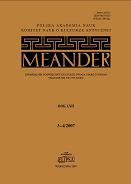"Ja" człowieka homeryckiego w wybranych interpretacjach filozoficznych
The Homeric "Self" According to Some Philosophical Interpretations
Author(s): Maria Marcinkowska-RosółSubject(s): Philosophy
Published by: Komitet Nauk o Kulturze Antycznej Polskiej Akademii Nauk
Keywords: early Greek thought; Homer
Summary/Abstract: This article presents and compares four different interpretations of the Homeric concept of "self". According to the first, the Homeric man has no concept of himself as a psychic unity, but only as a number of physical and psychical organs (Bruno Snell). The second says that he perceives himself as a complex but unified structure of psychical and physical elements (Norman Austin). According to the next view, the Homeric hero possesses the idea of reason which is able to create a unifying harmony among his various psychic powers and which constitutes the real self of a human being (Arbogast Schmitt). The fourth interpretation holds that the Homeric man identifies himself with his "Leib", which is the seat of all his sensations, feelings and thoughts (Hermann Schmitz).
Journal: Meander
- Issue Year: 62/2007
- Issue No: 3+4
- Page Range: 211-233
- Page Count: 23
- Language: Polish

